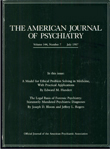CSF corticotropin-releasing hormone in depressed patients and normal control subjects
Abstract
The authors studied CSF corticotropin-releasing hormone (CRH) and plasma cortisol in 22 depressed patients and 18 normal control subjects. CRH levels were similar in the two groups. Depressed patients who were nonsuppressors on the dexamethasone suppression test had significantly higher levels of CRH than suppressors did. The depressed patients' CRH levels were significantly correlated with 4:00 p.m. postdexamethasone plasma cortisol levels. While the inclusion of a depressed patient with an outlier CRH value resulted in the loss of statistical significance for both of these findings, the authors suggest that these results support the hypothesis that hypercortisolism in depressed patients in part reflects a defect at or above the hypothalamus, resulting in hypersecretion of CRH.
Access content
To read the fulltext, please use one of the options below to sign in or purchase access.- Personal login
- Institutional Login
- Sign in via OpenAthens
- Register for access
-
Please login/register if you wish to pair your device and check access availability.
Not a subscriber?
PsychiatryOnline subscription options offer access to the DSM-5 library, books, journals, CME, and patient resources. This all-in-one virtual library provides psychiatrists and mental health professionals with key resources for diagnosis, treatment, research, and professional development.
Need more help? PsychiatryOnline Customer Service may be reached by emailing [email protected] or by calling 800-368-5777 (in the U.S.) or 703-907-7322 (outside the U.S.).



